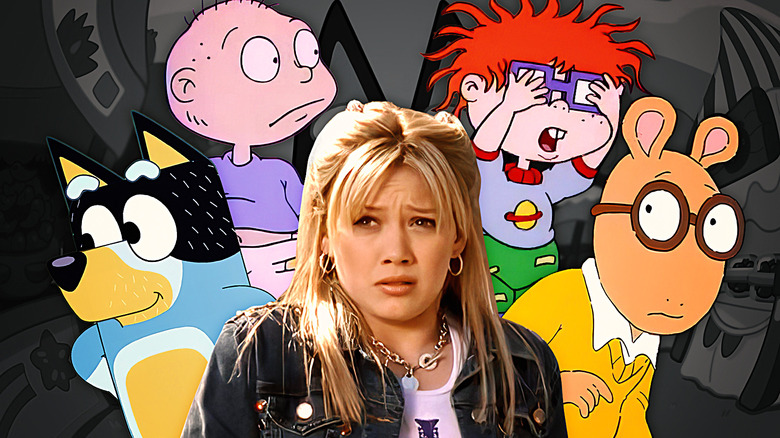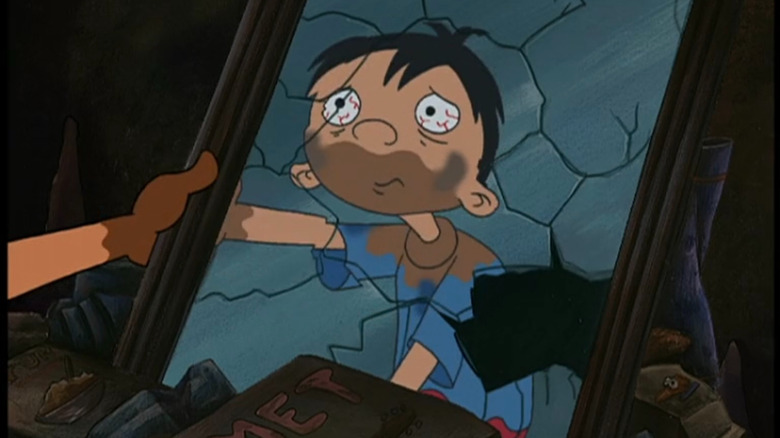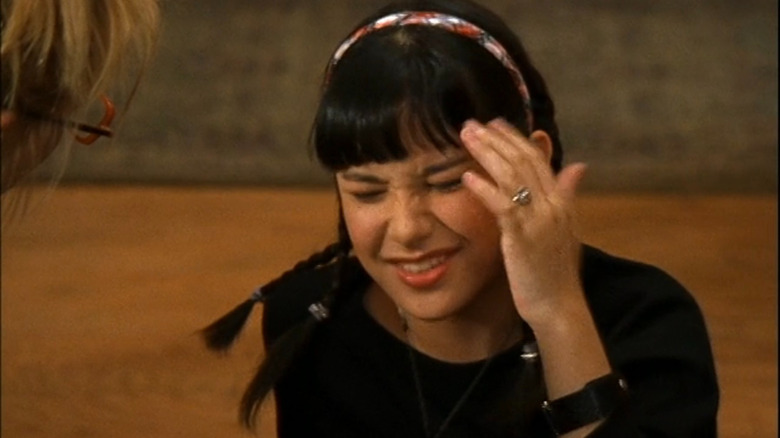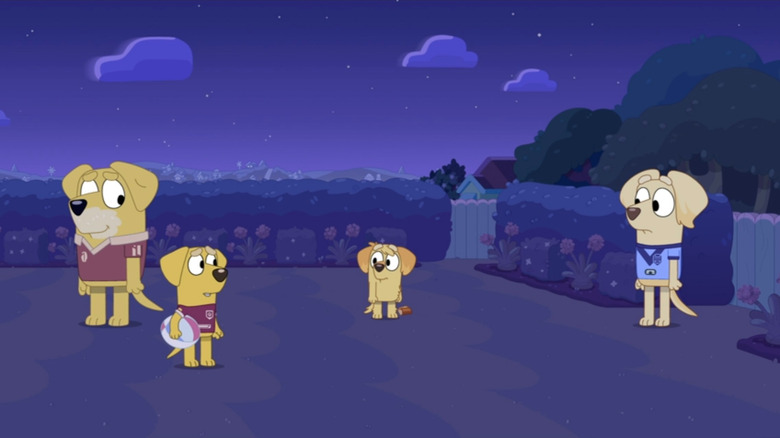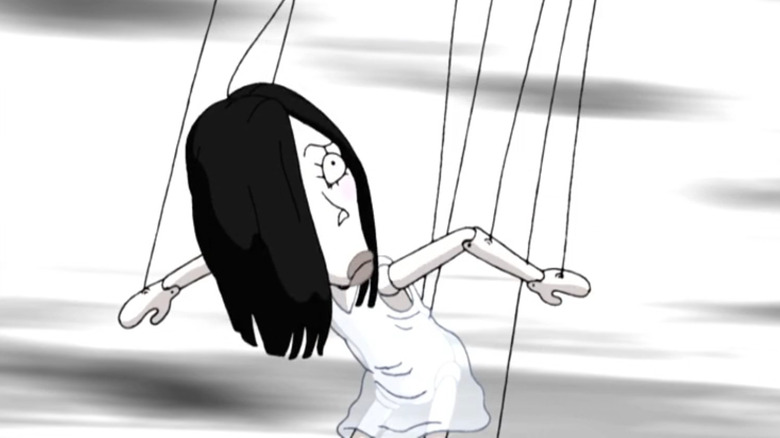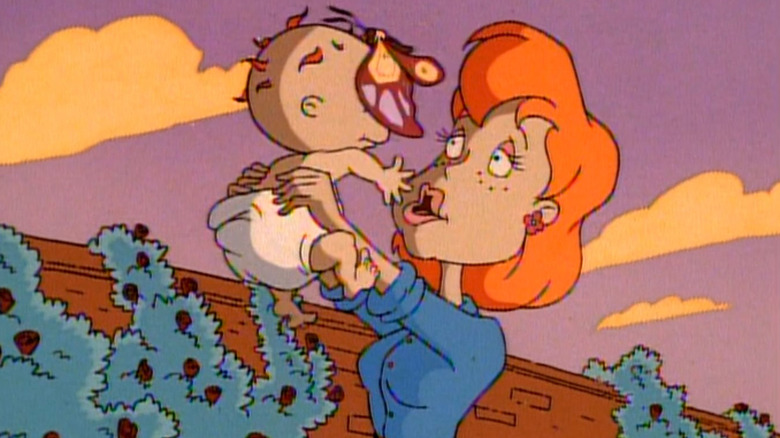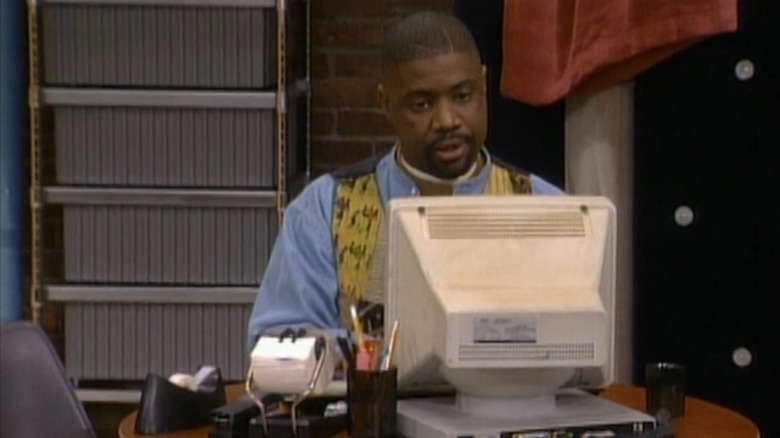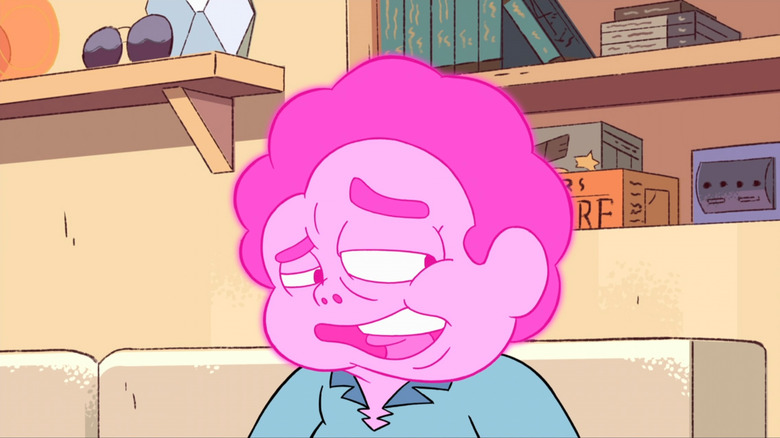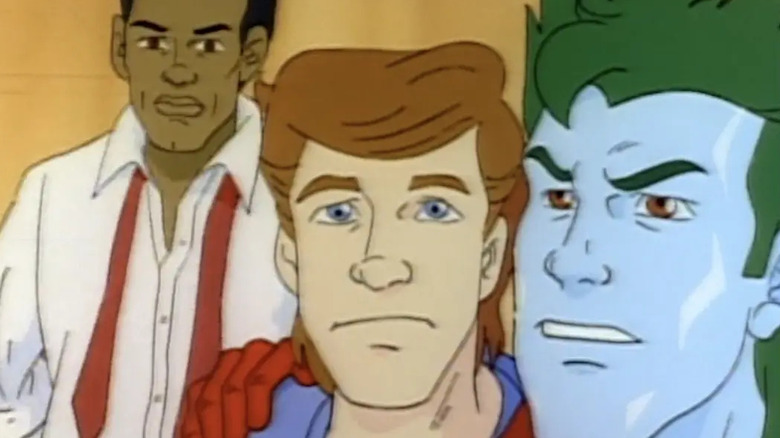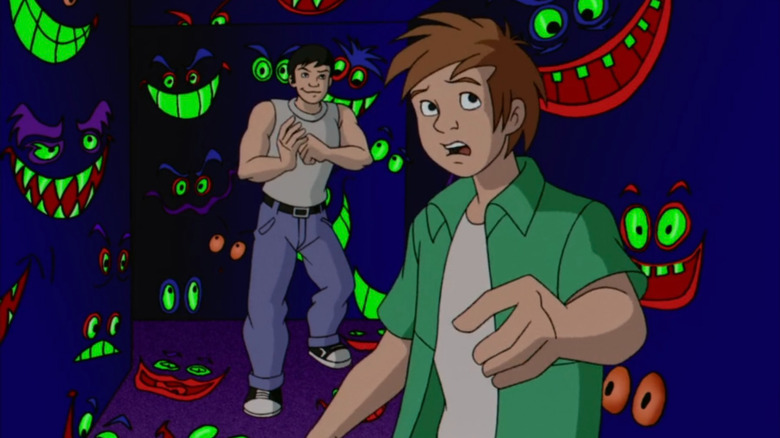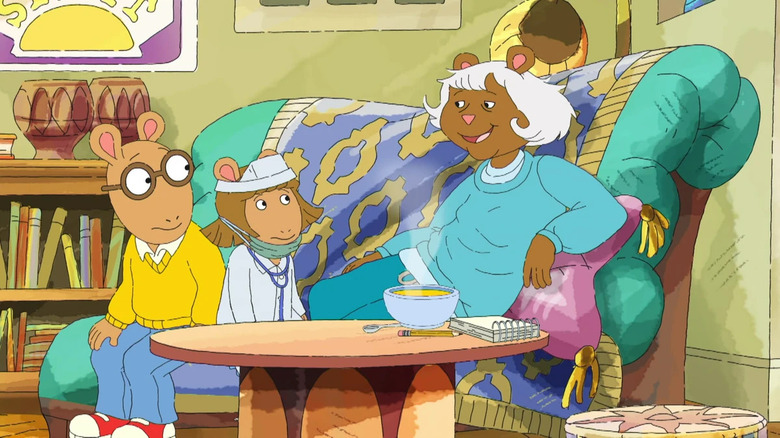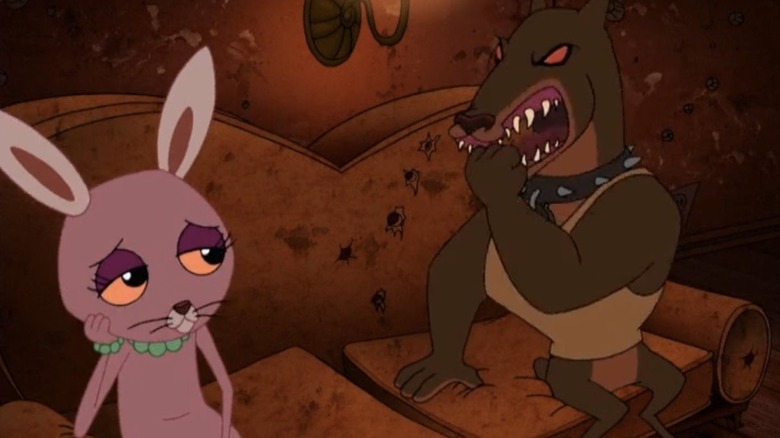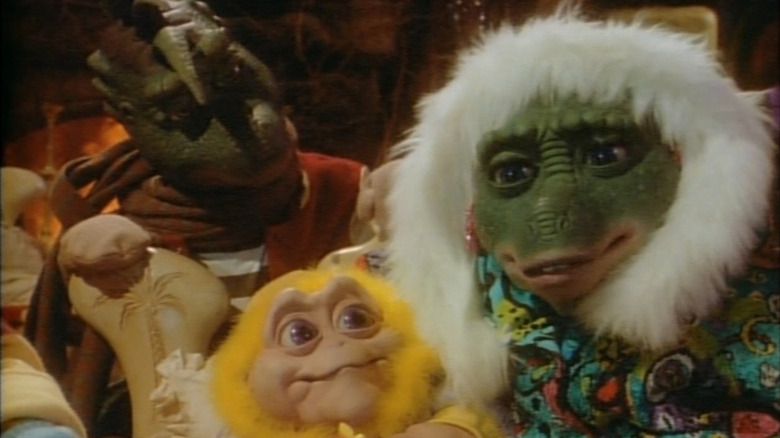12 Kids' Shows That Covered Extremely Dark Topics
To a passing observer, much of children's television may come off as crude or odd. A parent may see their kid watching something with bright, flashing colors and wonder what exactly it's doing to their development. Truth be told, a lot of children's media is designed to introduce youngsters to important life lessons, like the necessity of saying sorry. And even when an episode is about something as inconsequential as riding a giant boulder to deliver a Krusty Krab pizza, it can still become a touchstone in so many lives.
Kids are smarter than adults are sometimes willing to give them credit for. Those working in children's media surely understand that, which is why some kids' shows occasionally delve into darker subjects that may make some wonder if it's really appropriate for someone who's not even 10 yet. However, it's crucial for kids to at least have a baseline knowledge of certain subjects so that they can approach it with more nuance later in life. From depression to addiction, there's a good chance many people's first exposure to these topics came from their favorite TV series.
Dark topics in children's shows are nothing to shy away from. And now that you're an adult reading /Film, here are some of episodes in kids TV shows with dark topics that you may have glossed over earlier in life that have greater thematic resonance than you initially realized.
Hey Arnold - Chocolate Boy
"Hey Arnold!" was a surprisingly profound children's show that saw the titular Arnold help the people around the city with their problems. In season 5's "Chocolate Boy," he assists the character of the same name. Up to this point, Chocolate Boy was mostly used as a gag — a young kid obsessed with chocolate, often having it smeared across his face. But in "Chocolate Boy," he realizes he has a genuine problem after dancing for malted milk balls and scrounging around in a dumpster trying to get his next sweet fix.
The episode offers a nuanced take on addiction, with Chocolate Boy hitting rock bottom before actually taking sobriety seriously. After hypnosis, Arnold gets to the heart of Chocolate Boy's addiction — his nanny leaving him. Addiction is a complex field, but using substances, whether it's alcohol or chocolate, is a common way to make up for a sense of abandonment. By the end of the episode, Chocolate Boy's off chocolate, but he's now eating hundreds of radishes a day, effectively trading one vice for another. One could argue eating radishes all the time is better than chocolate, but trading one addiction for another is a common behavior that can actually make one more prone to relapse.
That's precisely what happens here. Later episodes show Chocolate Boy's face smeared in chocolate once again, which should've been expected seeing as between 40% and 60% of addicts relapse at some point.
If you or anyone you know needs help with addiction issues, help is available. Visit the Substance Abuse and Mental Health Services Administration website or contact SAMHSA's National Helpline at 1-800-662-HELP (4357).
Lizzie McGuire - Inner Beauty
It makes sense for "Lizzie McGuire," a show about a teenage girl facing the trials and tribulations of adolescence, to tackle a social issue that affects far too many young girls: eating disorders. In season 2's "Inner Beauty," Gordo (Adam Lamberg) films a music video featuring Lizzie (Hilary Duff) and Miranda (Lalaine), when he makes an off-hand remark about how much Miranda's eating. Miranda starts believing she looks fat in photos, much to the protest of her friends, and she stops eating entirely at lunch. It almost leads to her fainting when they practice dancing again.
Studies suggest a reported 22% of children and adolescents worldwide suffer from some level of disordered eating, with young girls being particularly vulnerable. Despite body image issues sometimes taking years to resolve, Miranda's totally fine by the end of the episode. This may not be surprising to an extent, as TV shows often have to fall back on the status quo, but it makes "Inner Beauty" fall into the camp of "very special" TV episodes that offer an easy resolution for complicated issues.
Perhaps the episode's easy solution foreshadowed what was to come with the planned "Lizzie McGuire" reboot, which was reportedly canned for not being as "family-friend" as Disney would've liked. At least "Inner Beauty" shows Lizzie trying to be a good friend and talk to Miranda about her problems, exemplifying the importance of friends being willing to have those tough conversations.
If you need help with an eating disorder, or know someone who does, help is available. Visit the National Eating Disorders Association website or contact NEDA's Live Helpline at 1-800-931-2237. You can also receive 24/7 Crisis Support via text (send NEDA to 741-741).
Bluey - The Decider
"Bluey" may be for younger kids, but it's easy to see why so many parents gravitate toward it. The ending of "The Sign" episode of "Bluey" emphasizes the importance of parents being emotionally available for their children, and other installments discuss things like infertility in ways kids can comprehend. Season 3's "The Decider" also falls into that camp, where the Heelers have the family across the street join them in watching a rugby game. However, Chucky feels conflicted throughout the game because his mother's across the street, rooting for the other team. He doesn't know which team to root for and finds himself literally caught in the middle.
It's not explicitly about divorce and child custody, but it's easy to draw a parallel. Adults can (sometimes inadvertently) put kids into the mix of their own conflicts. The rivalry between Chucky's parents is all in good fun, but Chucky still feels like he has to make a choice, not wanting to disappoint either parent.
"The Decider" not only shows kids how it's natural to feel put into the middle of adult conflicts, but it also shows parents the significance of supporting whatever choice a child makes, even if it hurts them personally.
As Told by Ginger - And She Was Gone
Becoming a teenager often means sorting through new, complex emotions. It can be tough to figure out what those emotions mean and even harder when other people are insisting they know what they are more than you. "As Told by Ginger" tackled many issues preteens face as they figure out who they want to be, and nowhere is that more apparent than in "And She Was Gone." The episode sees Ginger write a poem about a woman connected by strings who simply yearns to go away. With lines like, "She didn't have companions / No need for earthly things / Only wanted freedom / From what she felt were puppet strings," it's perhaps no wonder her teacher and school psychologist worried about her having depression.
The poem's recurring motif of the woman finally disappearing entirely could suggest something darker, and while it's good to an extent these authority figures wanted to make sure Ginger was okay, her declarations of being fine go ignored. Based on what we know from the character, she probably is fine (or at least not any more depressed than other preteens).
There's something far more nuanced going on with "And She Was Gone" than just being the depression episode of "As Told by Ginger." While Ginger may not require long-term treatment for depression, she mentions how it was nice to talk about her feelings. That's the most important lesson: at some point or another, everyone feels down and could benefit from just voicing their emotions.
Rugrats - Mother's Day
Apologies if you wanted to get through today without sobbing uncontrollably, but it's time to talk about the "Mother's Day" episode of "Rugrats." One of the best '90s cartoons usually saw the babies use their imaginations for playtime, but every so often, it brought things crashing back down to reality. That's the case here as the tykes make Mother's Day presents for their moms — except for Chuckie, who realizes he doesn't have a mother. Of course, he does, but she passed away at some point, and while scrounging around a closet, they stumble upon photos of her.
Death might be the darkest thing for a children's TV show to tackle, especially one where the central characters can barely even walk yet. However, it's a natural part of life, one that impacts people of all ages. Chas wants to put the photos away, but Didi insists that he continue talking about her so that neither he nor Chuckie forget about her. Just because someone has passed away doesn't mean their memories have to fade, too.
"Mother's Day" shows how children can be confused by death, and even adults aren't immune. For kids watching, it shows how even adults don't always know how to respond to death, so it's perfectly okay for them not to either.
Sister, Sister - Model Tia
The 2000s featured many technological advancements. The internet became more commonplace where many people got it for the first time, and social media began ramping up with sites like Friendster and MySpace. For preteens and teenagers, warnings about not trusting everything you see online. By 2024, that adage seems to have gone unheeded, but "Sister, Sister" at least tried to do its part with "Model Tia."
Tamera (Tamera Mowry) starts talking with someone claiming to be a photographer who can help her sister, Tia (Tia Mowry), get famous. Their parents understandably don't want them meeting up with this guy, but Tamera goes anyway, pretending to be Tia. Once at his place, Varique (Keith Amos) tries to get her to model a bikini for him. Tamera manages to get out of the situation all right, but the lesson is clear: Don't trust who you meet online, and definitely don't meet up with them in person.
Stranger danger has been a thing for decades, but when "Model Tia" came out in 1997, the internet was still something people were getting familiar with. And it's good for kids to understand how to safely navigate it. Now if only "Sister, Sister" had an episode to teach boomers about not believing every news story that comes on their social media feed, we could've avoided a lot of headaches in the modern day.
Steven Universe Future - Growing Pains
"Steven Universe" was praised for tackling themes like anxiety and death, and "Steven Universe Future," an epilogue series to the original one, followed those up wonderfully. In fact, it took things a step further by recontextualizing much of what happened in the first show, with /Film's review of "Steven Universe Future" praising how it handles surviving through trauma. No episode handles that more explicitly than "Growing Pains."
The episode sees Steven going through immense physical changes, only to realize it's a response to the emotional trauma he endured as a child. "Steven Universe" saw the titular character get attacked by monsters, watch clones of himself get dissolved, and see his friends almost die. And that's just the tip of the iceberg. All these things are common plot points in action-oriented TV shows, but "Growing Pains" tackles how badly any one of those would badly damage someone's psyche. Steven endured a lot, and trauma can have as much of a physical impact on a person as a mental one.
Plenty of people grew up watching the likes of "Power Rangers," "Ben 10," and numerous other series where literal children must save the world. That's a heavy responsibility for anyone, especially those who can't even legally vote yet. Other shows don't really address the psychological impact constantly getting attacked by monsters would have on someone, but then again, "Steven Universe" (and by proxy "Steven Universe Future"), isn't like most shows.
Captain Planet and the Planeteers - A Formula for Hate
"Captain Planet and the Planeteers" would probably get labeled as "woke" if it came out today, but it's overarching themes concerning environmentalism were much-needed at the time and probably required greater heeding from those in power. But the show tackled a variety of relevant issues, including being one of the first shows to address the HIV/AIDS crisis, a still often-misunderstood issue in the early '90s.
In "A Formula for Hate," a young man, Todd Andrews (voiced by Neil Patrick Harris), gets outed as having HIV/AIDS, causing derision from his classmates. This leads to a full-on mob lashing out against Todd's family, only for everyone to come together at the end to clarify that HIV/AIDS can't be spread through casual contact. The episode aims to normalize this illness and show how it isn't as scary as some nefarious forces would have them believe.
Today, the episode is a reminder of just how far the world has come. While there's still no cure, treatment is far more manageable, but there was a point not too long ago where this kind of messaging was needed.
Static Shock - Jimmy
"Static Shock" regularly saw the titular electricity-based hero battle all sorts of superpowered villains, but Season 2's "Jimmy" sets its sights on a different type of monster: gun violence. The episode centers on Jimmy, who's constantly bullied and decides to take his aggression out by bringing a gun to school.
"Jimmy" came out in May 2002, just three years after the events of Columbine left 15 dead (including the perpetrators) and two dozen more injured. School shootings have sadly remained a regular occurrence since that point, so shows directed toward kids and teenagers addressing this epidemic is a tragic necessity.
The episode does an admirable job highlighting various aspects of teenagers lashing out, such as a parent neglecting to lock up the weapon securely. The framing device sees Virgil, aka Static Shock, in therapy, going over what he could've done differently, showcasing how gun violence doesn't solely impact those directly shot, which in the episode is Richie, a bystander and one of Jimmy's few actual friends. A villain who can throw fireballs is one thing, but a kid who just needed some support is a tragic reality that society has still yet to truly reckon with.
Arthur - The Great MacGrady
"Arthur" ended its epic 25-season run in 2022, offering some reveals of what happens to the main characters in the future. But looking toward the past, "Arthur" provided plenty of outstanding episodes to help young kids understand the world better, including the scary reality of when someone close to you receives less-than-ideal medical news.
"The Great MacGrady" involves the Lakewood Elementary students learning that the school cook, Mrs. MacGrady, has cancer. Students react differently to the news, as is to be expected. Francine takes the news hard, as her grandfather died from cancer, while Muffy doesn't really grasp the severity of the situation initially. Ultimately, the episode shows how it's natural for people to take difficult news differently, with everyone just trying to make sense of such a dramatic development.
"The Great MacGrady" was co-written by Leah Ryan and inspired by her own cancer diagnosis. Ryan passed away before the episode made it to air, but she left behind a wonderful reminder of how it's okay not to feel okay when scary things happen to loved ones.
Courage the Cowardly Dog - The Mask
"Courage the Cowardly Dog" is typically seen as a dark show for other reasons than what's been mentioned on this list, frequently featuring horrifically-designed creatures. The Cartoon Network series regularly draws from horror films like "Jaws" and "The Exorcist," but "The Mask" episode introduces the show's young audience to the horror of domestic violence.
Kitty visits the Bagge farm and starts beating up Courage, only for it to be revealed her hatred toward dogs stems from her friend (and romantic partner, as revealed by series creator John R. Dilworth) being in an abusive relationship with her boyfriend, Mad Dog. Kitty's mask represents the unwillingness to face reality and her creating a false narrative that every dog out there is worthy of derision. Despite this, Courage wants to help but quickly realizes the dire straits Bunny is in when he finds her covered in dirt for trying to get away from him.
As far as dark topics in children's show, it demonstrates how people in abusive relationships often don't have the resources to just get up and leave. Luckily, "The Mask" has its happy ending with Kitty and Bunny reuniting, just two lesbians on a train with a brighter future ahead of them.
If you or someone you know is dealing with domestic abuse, you can call the National Domestic Violence Hotline at 1−800−799−7233. You can also find more information, resources, and support at their website.
Dinosaurs - Changing Nature
It's one thing for a kids' show to tackle death. It's another thing entirely for it to show how not only are you going to die one day, but everyone you know and love will die, and society itself can cease to exist. Anyway, the series finale of "Dinosaurs" is here to tell you all about it.
"Dinosaurs" ends with FruitCo messing with the environment and ushering in an ice age. The climate gets colder, and the show ends with the Sinclair family huddled together, wrapped in parkas, as the family patriarch, Earl, ensures them all that there's no way the dinosaurs could ever go away completely. Fortunately, young viewers were spared watching them expire onscreen, but the message is clear. Dinosaurs will soon go extinct, and if we're not careful, humanity could go the same way.
While an asteroid impact likely wiped out the dinosaurs in reality, the episode draws parallels with modern concerns surrounding climate change. The episode may have aired in 1994, but 30 years later, humanity hasn't heeded its warnings. The Earth has continued getting warmer, with the window quickly closing on mediating any of its effects. It's a lot for any kid (or adult for that matter) to take in. With something this heavy getting laid on you, it's understandable if you need to watch some "Severance" to relax a little.
